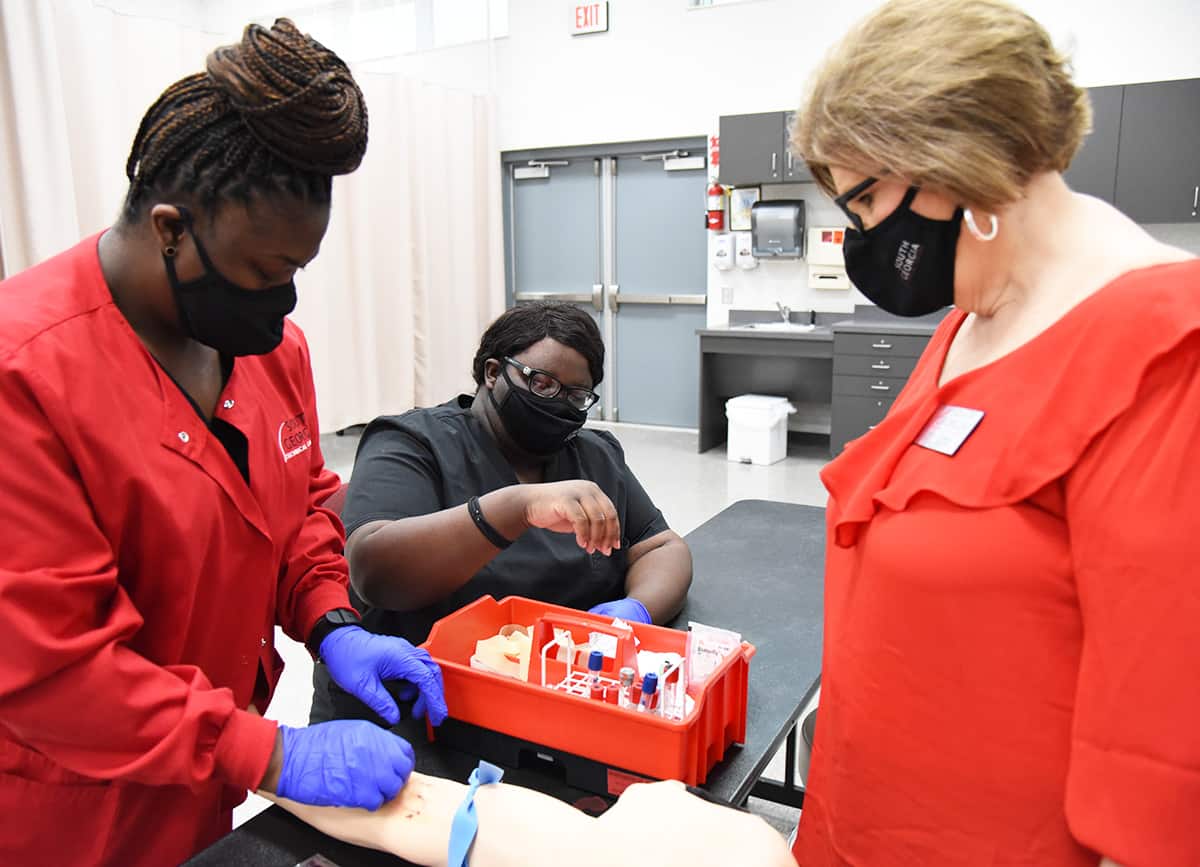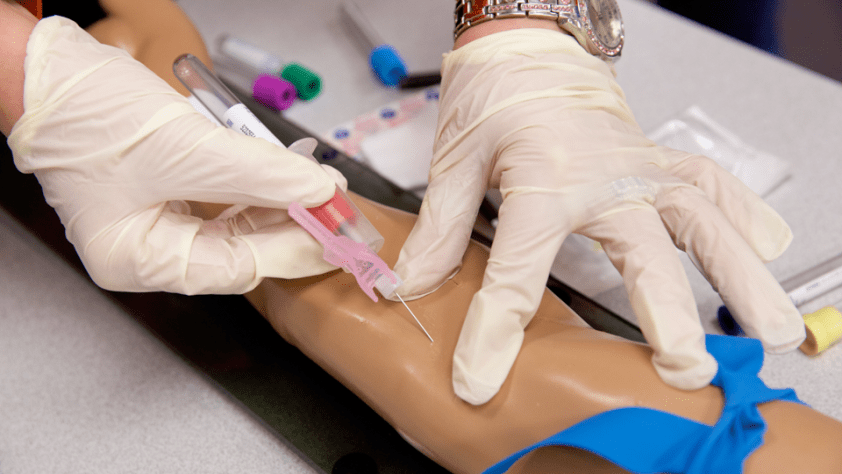Phlebotomy Classes Near Me: Part-Time Routes That Fit Your Schedule
Phlebotomy Classes Near Me: Part-Time Routes That Fit Your Schedule
Blog Article
The Path to Accreditation: Recognizing the Phlebotomy Educating Course Trip and Its Importance
As you consider the course to accreditation in phlebotomy, it is necessary to recognize the function you'll play in health care. Your training will cover important skills, from blood collection strategies to patient interaction. Each component of the program prepares you for the challenges in advance. However exactly what does the journey entail, and why is accreditation so critical for your future career? Allow's discover these inquiries better.

The Function of Phlebotomists in Health Care
Phlebotomists play a necessary role in the healthcare system, working as the essential link in between people and essential analysis screening. You'll do blood attracts, ensuring examples are collected precisely and safely. Your expertise helps in detecting clinical conditions, monitoring health and wellness, and leading treatment choices.
In your day-to-day communications, you'll require to develop count on with people, making them really feel comfortable during what might be a stressful experience. You are accountable for labeling and handling samples carefully to stop contamination or errors, which could influence examination outcomes.
Beyond this, you'll often work along with doctors and nurses, connecting crucial information concerning patients' problems. By understanding your abilities, you add meaningfully to patient care, making you an essential component of the medical team.
Summary of Phlebotomy Training Programs
When exploring phlebotomy training programs, you'll locate numerous kinds developed to fit various schedules and finding out styles. Each program aids you establish necessary skills like blood collection and client interaction. Recognizing these options is essential to picking the ideal course for your occupation.
Sorts Of Educating Programs
A number of types of training programs are available for those aiming to become skillful in phlebotomy. You can select from certification programs, which usually last a couple of months and concentrate on important abilities. There are additionally diploma programs that offer an even more thorough education, often lasting as much as a year. If you're looking for a deeper understanding, an associate degree in a relevant field may be the appropriate fit. On-line courses use adaptability for those balancing job or family members commitments, allowing you to research at your own pace. Additionally, some health centers and facilities use on-the-job training programs, giving practical experience while you learn. Whatever course you pick, each program intends to furnish you with the required skills for a successful phlebotomy job.

Key Skills Created
Grasping phlebotomy calls for a set of essential abilities that are established with detailed training programs. Furthermore, interaction abilities are essential; you'll require to engage with individuals, discuss procedures, and put them at ease. Each of these skills is essential for your success as a qualified phlebotomist, making you a beneficial asset in any health care setting.
Key Parts of a Phlebotomy Course
In a phlebotomy program, you'll concentrate on vital subjects that prepared for your future occupation. You'll take part in hands-on training that enables you to use what you have actually found out in real-world settings. Both the curriculum and sensible experience are important for your success as a phlebotomist.
Core Educational Program Introduction
While pursuing a phlebotomy training program, you'll run into a core educational program created to equip you with essential abilities and expertise. Phlebotomy Training Course. This curriculum typically includes composition and physiology, concentrating on the blood circulation system and understanding blood elements. You'll additionally find out about various kinds of blood collection techniques, consisting of venipuncture and capillary slit strategies
In addition, infection control and safety procedures are necessary components, guaranteeing you know exactly how to maintain a clean and sterile environment. You'll research patient communication, highlighting interaction and compassion, which are vital for alleviating individual anxiety.
Hands-On Training Experience
Getting hands-on experience is a crucial part of your phlebotomy training course. This practical training permits you to apply what you've learned in a real-world setting, improving your skills and self-confidence. You'll practice venipuncture techniques, learn exactly how to take care of different types of specimens, and get acquainted with the devices made use of in the area. Under the guidance of skilled trainers, you'll improve your abilities, ensuring you're gotten ready for any type of situation you might deal with.
In addition, you'll get the possibility to engage with patients, which is vital for creating your interaction skills. This combination of technical proficiency and interpersonal skills is essential for your success as a certified phlebotomist. Eventually, hands-on training is where theory meets practice, solidifying your expertise and preparedness for accreditation.
Certification and Licensing Requirements
Before you can begin your job in phlebotomy, it is important to recognize the qualification and licensing requirements that differ by state. Most states call for phlebotomists to hold an accreditation from an identified organization, such as the National Phlebotomy Organization or the American Society for Clinical Pathology. These qualifications usually include passing a test that tests your expertise and skills in the field.
In addition to certification, some states have specific licensing demands. You might require to complete a certain variety of hours in clinical technique, submit evidence of training, or go through a history check. It is essential to research your state's policies to make sure you fulfill all needed requirements.
Remaining notified regarding these requirements not only helps you secure a position but also enhances your trustworthiness as an expert. By satisfying these demands, you'll be well on your way to a successful career in phlebotomy.
Hands-On Training and Practical Experience
Hands-on training and practical experience are essential parts of your phlebotomy education and learning, as they enable you to apply theoretical knowledge in real-world scenarios. Throughout your training, you'll engage in supervised venipuncture, find out correct methods, and become acquainted with numerous blood collection devices. This direct participation is important for developing your confidence and sharpening your abilities.
You'll work closely with experienced specialists who can guide you via the subtleties of client interaction and example handling. Each session not only reinforces your understanding yet additionally prepares you for the hectic environment of medical care setups.
In addition, lots of programs incorporate clinical turnings, allowing you to experience varied her comment is here settings, from medical facilities to outpatient facilities. This exposure aids you adapt to various difficulties and person needs, ensuring you're well-prepared for your future role. Embrace these opportunities, as they're important to becoming a qualified and caring phlebotomist.
Obstacles Dealt With Throughout Training
While getting hands-on experience is important, it's crucial to identify the obstacles that can arise during your phlebotomy training. In addition, mastering the skills required for blood draws takes method; you may have a hard time with method originally.
Time monitoring can additionally be a hurdle, as balancing theory, practical sessions, and personal commitments can feel intimidating. You may face varying learning paces amongst your peers, leading to sensations of insecurity if you assume you're falling my company back. Adapting to the various individualities of teachers can be tough, as each may have a distinct mentor style.
Recognizing these obstacles early on can prepare you for success and aid you establish durability throughout your training journey.
Job Opportunities After Qualification

As you gain experience, you could even take into consideration specializing in locations like pediatric or geriatric phlebotomy, satisfying details client demands. Some phlebotomists choose to progress their careers by coming to be laboratory professionals or going after more education in medical care areas.
Furthermore, your qualification can lead to functions in training or supervising new phlebotomists, enabling you to share your expertise. With the healthcare sector continually growing, your abilities will always remain in need, leading the way for a stable and satisfying job. Accept the chances awaiting you!
Frequently Asked Concerns
What Is the Regular Period of a Phlebotomy Training Program?
Phlebotomy training programs generally last around four to 8 weeks. You'll involve in hands-on practice, classroom direction, and on-line knowing. Finishing this training prepares you for certification and a satisfying job in healthcare.
Are Online Phlebotomy Courses Available?
Yes, online article phlebotomy programs are readily available. They offer versatility and ease, allowing you to study at your own speed. Simply validate the program is accredited to satisfy qualification requirements and acquire important skills for your occupation.
Just How Much Does Phlebotomy Training Typically Cost?
Phlebotomy training usually sets you back between $700 and $2,500, depending on the program and location. You should think about aspects like program length, included products, and hands-on experience when picking the ideal training for you.
What Prevail Requirements for Phlebotomy Training?
Typical prerequisites for phlebotomy training commonly include a high college diploma or GED, booster shots, and a background check. Some programs might also require standard health care knowledge or qualifications, ensuring you're planned for hands-on training.
Can I Work While Finishing My Phlebotomy Training?
Yes, you can work while finishing your phlebotomy training. Numerous pupils balance tasks with their studies, however ensure to manage your time properly to ensure you fulfill both work and training dedications efficiently.
Report this page